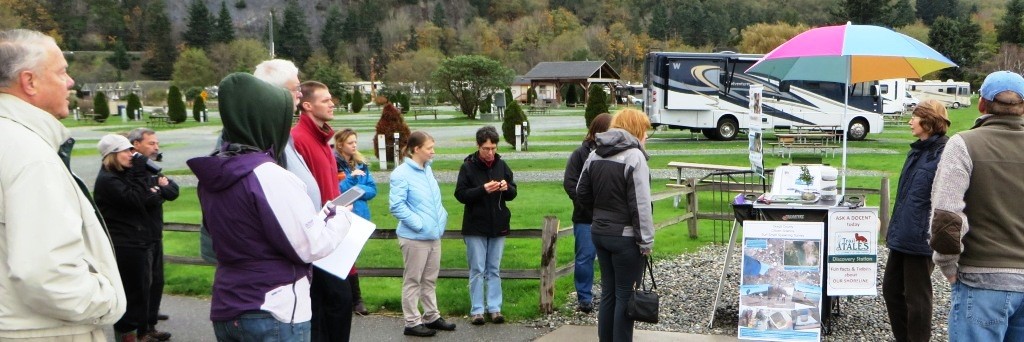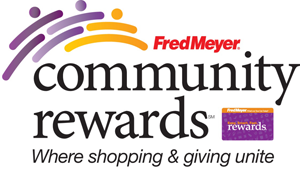An Afternoon to Remember - by Pete Haase
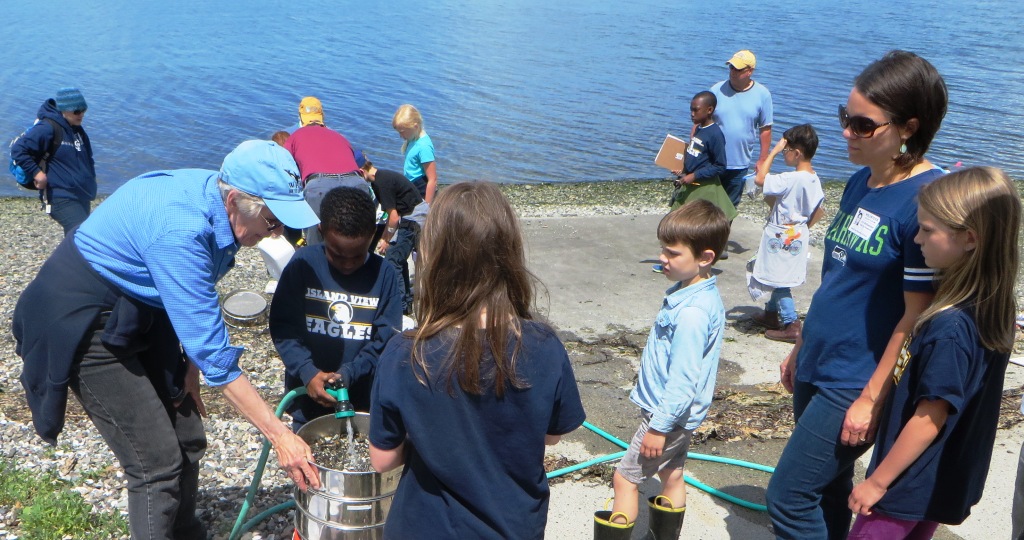
Friday June 2, 2017 was an afternoon many of us will remember for a long time. Nineteen youngsters and some parents from the mixed 1 – 2 – 3 grade class taught by Abigail Ross at Anacortes Island View Elementary hopped out of a bus at 12:30 at the Fidalgo Bay Resort on a promise that they could go do surveys for surf smelt eggs. A dozen of us big guy volunteers stood there as ready as we felt possible, wondering what we were in for.
This story starts in January. Jack Middleton and I were up at the Bald Eagle Festival in Rockport on a Saturday doing a presentation and an outside demonstration about Forage Fish, the kind of thing that’s part of our Fidalgo Bay Aquatic Reserve Citizen Stewardship Committee (FBARCSC) education mission. A lady leaned over the edge of the deck at the Interpretive Center there and asked – “Say, can you do that for a class of kids?” Jack jumps right up and says – “Sure. That is a great idea!” The lady was Abigail.
Coincidently, also in about January, Glen Alexander, an educator at the Padilla Bay National Estuarine Research Reserve in Bayview, had asked Barbara Lechner and Michelle Marquardt if they could expand their Trail Tales Forage Fish Interpretive station into a program for young children. They did that with great success. Somehow, also coincidently, that led to them sharing their interpretive station and activities with the Before School program at ... Island View Elementary School ... again with great success. Now we HAD to produce.
With a lot of help and creative ideas, we made some simplified field sheets about surf smelt surveying and a “script” for the big guys to follow as they led the little ones on the beach. Our FBARCSC was able to buy many clipboards, print all the sheets and instructions, and supply all the materials needed; like gravel scoopers, collection bags, sample jars, rulers and GPS units. Our local Marine Resources Committee (MRC) let us borrow their complete Forage Fish Survey equipment kit as did the Whatcom (MRC.) With the set we have for FBARCSC that made three complete stations we could operate and keep the kids well occupied.
Padilla Bay donated their microscope with camera and display screen, with an operator, and a local volunteer citizen did the same. Many folks from our usual Forage Fish survey teams and also from recent Salish Sea Stewards classes came to help. The Samish Indian Nation let us use the clubhouse, facilities, and the beach on the shore of Fidalgo Bay.
The teacher had the kids divided into 5 groups of 4 and each had a name – like the “Fun Forage Fish Finders” and “Soaring Skagits.” We had two of our volunteers and a parent with each group!
A few days prior, Michelle and Barbara took their fun forage fish program into the classroom and gave the kids a great understanding of surf smelt and good beaches and why they are important – much of which they had already studied. When they “hit the beach” they knew what they needed to do.
It was quite a show. Each group headed for a spot on the beach where they thought it might be good for surf smelt to have spawned. The kids did as much of the work as they could. They stretched out a big yellow measuring tape and found out how many steps they needed to measure 33 and 50 feet – distances needed to do a survey. Then they began digging and looking in the sand and gravel and collected a nice bag of sample material from a 100 ft “transect.” Most of the groups were able to find eggs in the gravel, right at their spot, with their eyes and even better with a hand-lens. One group found a HUGE swath! On their field sheet they documented the GPS location of their sample site, the amount of shading, the type of substrate, and the distance from the high tide line to their transect line – all data collected during a normal survey.
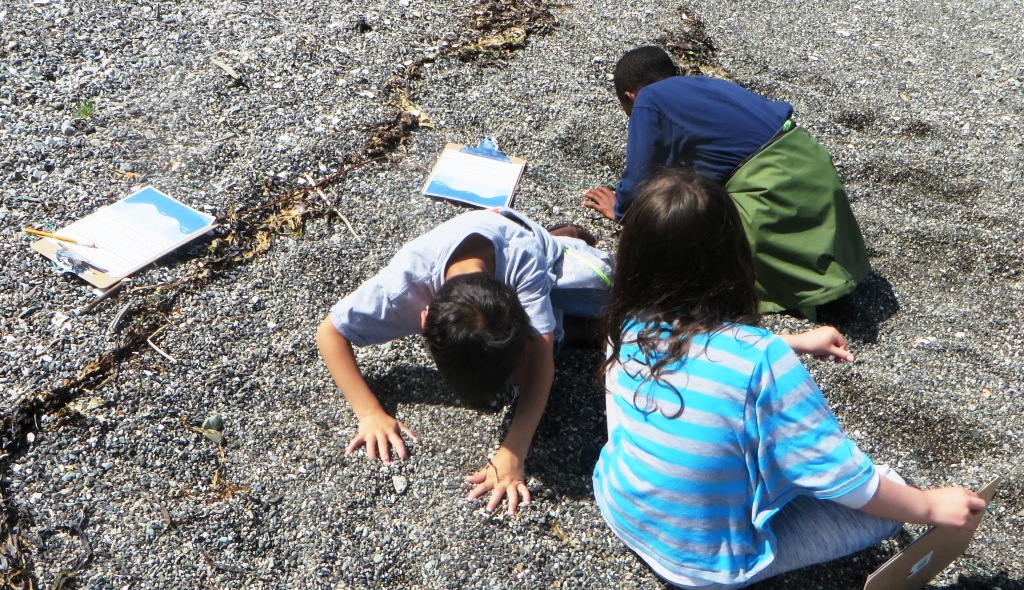

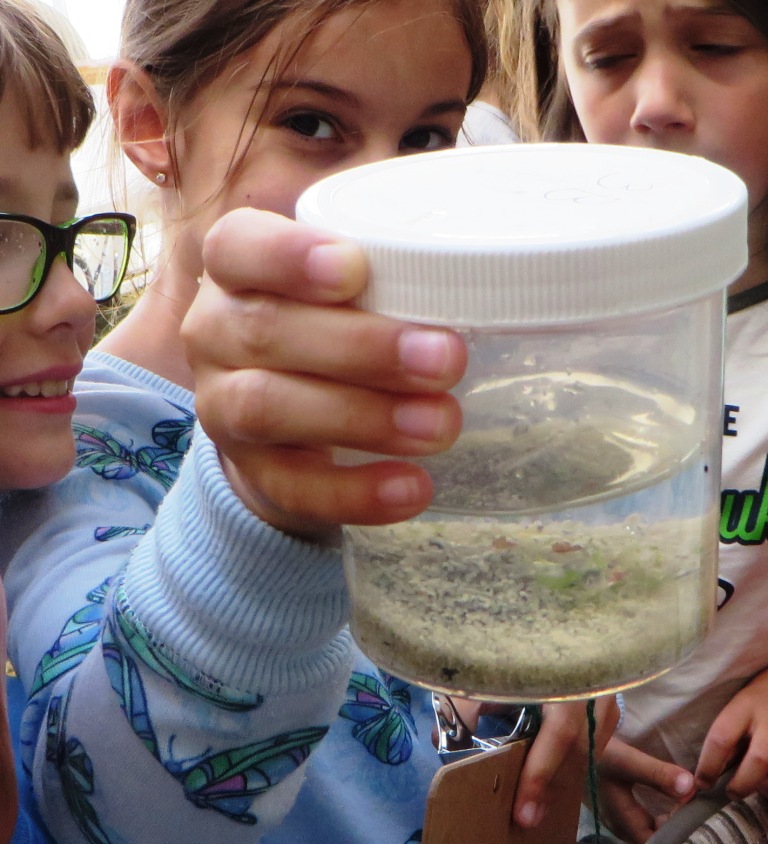
They were so excited to have a bag of gravel with some eggs in there. Back they came and rinsed the gravel in sieves to separate the eggs and small particles and then ran the results through the fun “Blue Bowl” to better isolate the eggs into a sample jar. Now they could see so many! Then they took their sample inside to the microscope for a lot of ooohing and ahhhing as they saw their “finds” up close and in various stages of development. Finally they took the eggs back to the beach and did their best to get them back into a place where some will survive and hatch.
A young fellow in my group said – “The BEST day ever!” Most of us felt like that too at the time.

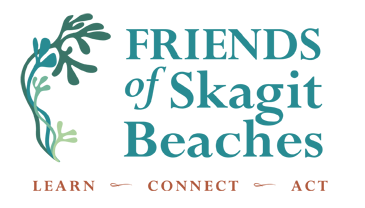




 Friends of Skagit Beaches volunteers, Barbara Lechner and Michelle Marquardt, have developed a very popular interactive forage fish interpretive station and now expanded that into a program for Junior Ecologists (ages 5 – 9). Through the use of slides, props and participation, children have a fun experience learning about forage fish - what forage fish are, why forage fish are so important, who eats forage fish, and what makes a healthy beach for Surf Smelt egg spawning. The program is concluded with a forage fish song sing-a-long and coloring pages reinforcing the information. This type of interactive learning helps students develop a personal connection to our marine environment, which we believe helps to foster a life-long commitment to environmental stewardship.
Friends of Skagit Beaches volunteers, Barbara Lechner and Michelle Marquardt, have developed a very popular interactive forage fish interpretive station and now expanded that into a program for Junior Ecologists (ages 5 – 9). Through the use of slides, props and participation, children have a fun experience learning about forage fish - what forage fish are, why forage fish are so important, who eats forage fish, and what makes a healthy beach for Surf Smelt egg spawning. The program is concluded with a forage fish song sing-a-long and coloring pages reinforcing the information. This type of interactive learning helps students develop a personal connection to our marine environment, which we believe helps to foster a life-long commitment to environmental stewardship.